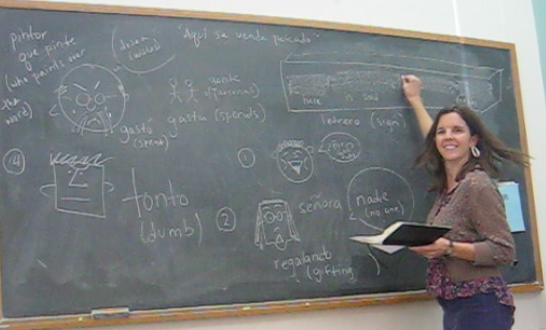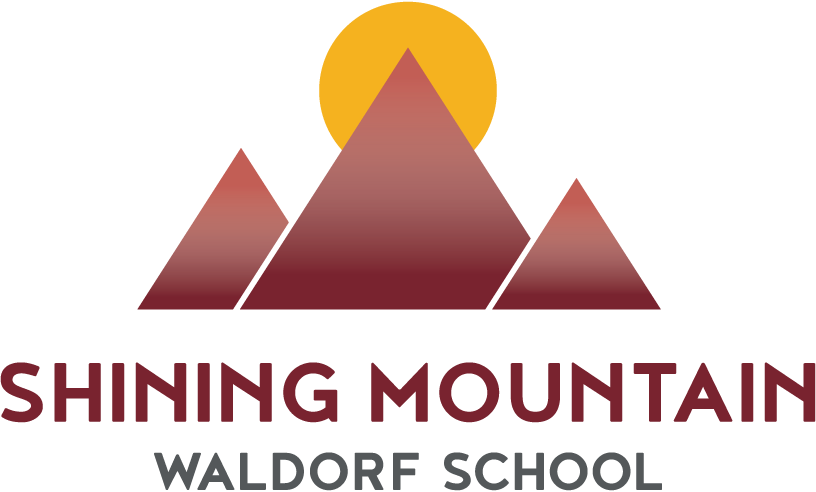By Julie Irwin
SMWHS Spanish Teacher
My first child hardly spoke one word until he was three years old. Alternately, my other child couldn’t stop speaking from the time he opened his mouth. The third is still so young we will have to wait and see.
You don’t have to be a language teacher to know it: all we need to do is provide meaningful and understandable experiences with language, and people will speak eventually. Linguist Dr. J Marvin Brown writes of natural language learning: “The words don’t carry the meaning–the meaning carries the words.” He goes on to compare the way we talk and tell stories to young children–using plenty of context and non-verbal communication–to how we have traditionally taught languages over the last decades to students in traditional school settings: “When we talk to toddlers, we realize that meaning carries the words – and therein lies our magic. When we talk to language-deprived adults in a traditional vocabulary list/textbook/grammar class, we think that the words carry the meaning–and therein lies the problem.”
Each time you hear or read a word in a comprehensible context, you acquire a little bit of it, but not enough to fully produce or even be able to define it. You won’t master the words after one or even a few hearings, and you might not be able to pull it out of your brain and actually use it in conversation. But you are gradually building up to full acquisition. This is what I aim for in both my children’s and my students’ minds.
For true acquisition, I want the language to be stored in their subconscious, not go to their conscious minds. This is why I tell my students to concentrate on the meaning rather than on individual words. We need to remember and trust that speaking is the result of acquired competence in a language, not the cause. A syllabus based on meaning, not linguistic forms, is the only way to create a mental picture in people’s minds. Once people have a mental picture, speaking comes naturally. “Sentences grow from entire meanings, from complete intentions, not one word at a time.” (Frank Smith, 1986, p. 23). Consider too, how we have about 120 (maximum – excluding student absences, snow days, and other cancellations) hours a year in our High School language classes (less in Lower School). If we were to compare this to time spent in a foreign country, this averages out to only eight (!) 15-hour days of immersion in a foreign country in one school year. Enough immersion to actually hold on to the second language we are hearing, as opposed to forgetting it after a couple weeks, takes time. Lots and lots of time –and listening.
So, the next time you find yourself wondering why it is so hard to truly speak a second language (even after you’ve had 4+ years of it), ask yourself if you have enough rich, meaningful exposure. When I lived in Chile, I stayed with a family who fed, supported, and loved me. My host mamá, Cristina, would ask me about my day, help me with my homework, tell me which empanada restaurant to avoid and which bus line to take to get from Viña to Valpo. Through my time researching Second Language Acquisition I see that there is a term for someone like Cristina: A “Language Parent.” Linguist Stephen Krashen says “this is someone who will engage you in conversation in the language you are acquiring, will try to understand what you say, not correct your grammar all the time, and is interested in you as a person.” He notes that having a Language Parent is one of the most important aspects in acquiring a second language.
We know how first language acquisition happens for kids in a really messy way, with constant interruptions and constant errors. In spite of the messy atmosphere, if the input, or the story, is reaching them, we know that some part of the messages are entering their minds and hearts, so we ought to feel satisfied. In the beginning, their only job is understanding. Later, advanced learners can “do” something with what they hear and read. We can practice speaking in the meantime, but to get them to the point that language is falling out of their mouths, that takes loads and loads of input. Even a student who takes language from grades 7-12 and gets 600 hours of input is still 4,000 to 5,000 hours of input behind an 18-month old. Linguist Bill Van Patten says regarding speaking: “the ability to string words together in real time to communicate meaning, and to use grammar to do that, is developmentally constrained. You can’t get learners to produce and practice something they’re not developmentally ready for.”
We can be free from the idea that acquiring a language is an academic pursuit requiring skill building and drilling of forms and lists. We can be free from the idea that students in the same year (or children in the same family) should be able to say or “do” all the same things, because kids acquire elements of language in different orders and at different rates. So if we can’t really speed up the acquisition process by teaching language explicitly, what do we language teachers call ourselves? Perhaps a change in the terminology could be considered–from “language teacher” to “communication partner” or “language parent.” Some schools are really doing this, but that deserves its own article. For now I’ll go put on some Juanes and preparar algunas galletas de chocolate with my children.

Julie Irwin is the High School Spanish teacher at Shining Mountain Waldorf School and a parent of 3 young children, two of whom attend the school.
